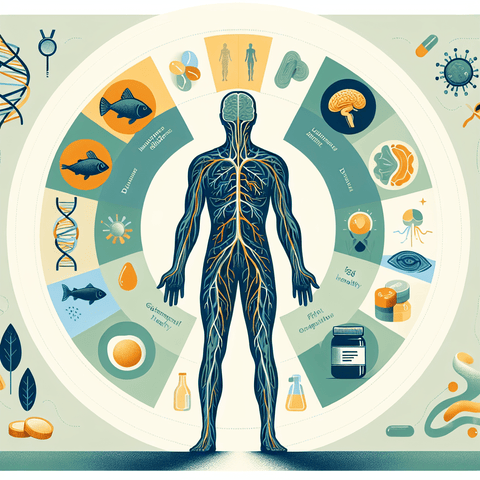Introduction: Understanding Vitamin B12 Deficiency in the Context of Nutritional Supplements
Vitamin B12, also known as cobalamin, is an essential water-soluble vitamin that plays a pivotal role in the human body. It is necessary for the formation of red blood cells, proper neurological function, and DNA synthesis. A deficiency in vitamin B12 can lead to a range of health issues, including megaloblastic anemia, cognitive impairment, and irreversible neurological damage if left unchecked. With the increasing global shift toward plant-based diets and the prevalence of certain chronic illnesses, understanding vitamin B12 deficiency and its causes has become more important than ever.
Unlike some other vitamins, vitamin B12 is not readily produced or stored in sufficient quantities by the human body. It must be obtained from dietary sources, primarily animal-based foods, or through supplementation. However, some diseases and medical conditions can interfere with the body's ability to absorb or utilize vitamin B12, even when the intake appears adequate. Such malabsorption can render traditional dietary approaches ineffective, necessitating specialized supplementation strategies such as high-dose oral tablets or injectable forms.
In this blog post, we'll explore the intricate connection between specific diseases and vitamin B12 deficiency. From autoimmune disorders like pernicious anemia to structural impairments due to gastrointestinal surgery, we'll break down how these conditions influence B12 absorption and how supplementation plays a critical role in managing and preventing deficiency. Furthermore, we’ll highlight the symptoms to look out for, the importance of early diagnosis, and the options provided by nutritional supplements to help maintain optimal health.
1. Vitamin B12 Deficiency and Its Significance in Nutritional Supplementation
Vitamin B12 is indispensable in numerous metabolic processes. One of its most vital roles is assisting in the production of red blood cells. Without adequate B12, red blood cells become abnormally large and ineffective, leading to a condition known as megaloblastic anemia. Additionally, B12 is critical for the maintenance of the nervous system, where it participates in the production of myelin—a protective sheath that ensures effective nerve signal transmission. Its function in DNA synthesis further illustrates the vitamin's wide-reaching impact on cellular health and replication.
Symptoms of vitamin B12 deficiency can be subtle at first but become progressively severe. Early signs often include fatigue, weakness, pale skin, and tingling sensations in the hands and feet. As the deficiency worsens, individuals may experience difficulty walking, mood disturbances such as depression or irritability, and in extreme cases, cognitive decline and dementia. Detecting and addressing the deficiency early is key to reversing symptoms and preventing lasting damage.
Supplementation is often required to restore B12 levels, especially when the underlying cause involves malabsorption. Oral supplements can suffice for individuals with mild deficiencies or those caused by dietary insufficiency. However, more severe or medically induced deficiencies may require intramuscular injections or sublingual formulations. Nutritional supplementation thus becomes an essential tool, bridging the gap when food sources fall short or absorption is impaired.
Underlying health issues complicate the supplementation landscape. Patients suffering from autoimmune or gastrointestinal conditions may not effectively absorb B12 from oral sources due to damage or loss of specific digestive components like intrinsic factor. In such scenarios, bioavailability and dosage forms become critical considerations for both patients and healthcare providers. With the help of nutritional products, such as those offered in the vitamin and mineral supplement ranges, individuals can access targeted solutions that align with their specific needs, including energy support, immune function, and nervous system health.
2. Pernicious Anemia: An Autoimmune Attack on B12 Absorption
Pernicious anemia is a chronic autoimmune condition that specifically interferes with vitamin B12 absorption. It results from the immune system mistakenly attacking the body's own gastric parietal cells or intrinsic factor, a protein secreted in the stomach that is essential for the absorption of vitamin B12 in the terminal ileum of the small intestine. Without intrinsic factor, orally ingested B12 cannot be efficiently absorbed, no matter how much is consumed through food or standard supplements.
In individuals with pernicious anemia, ongoing autoimmune activity leads to diminished intrinsic factor and atrophy of the stomach lining over time. Consequently, B12 absorption plummets, leading to chronic and progressive deficiency. The symptoms often mirror general B12 deficiency signs but may also include severe fatigue, brain fog, balance issues, and in advanced cases, psychosis or paranoia. Laboratory testing often shows elevated methylmalonic acid and homocysteine levels, which are sensitive markers for true tissue-level deficiency.
Treatment of pernicious anemia typically bypasses the gastrointestinal tract altogether. High-dose intramuscular injections of vitamin B12 are the standard of care, especially during initial replenishment stages. Once B12 levels are restored, some patients might switch to high-dose oral therapy or sublingual forms, depending on individual absorption capacity and physician recommendation. It's essential to maintain treatment for life, as the autoimmune process does not resolve spontaneously.
The role of supplementation here is not merely supportive—it becomes life-sustaining. Utilizing products from premium supplement providers ensures individuals with pernicious anemia have access to high-quality, bioavailable forms of vitamin B12. For example, selecting methylcobalamin over cyanocobalamin may offer improved neurological outcomes, although both forms are effective. Incorporating B-complex formulations or pairing with vitamin D supplements may also support broader immune and metabolic functions, especially since comorbid deficiencies are common among this population.
3. Malabsorption Syndromes: Conditions That Hinder B12 Absorption in the Gut
Malabsorption syndromes refer to a group of disorders that impair the intestine's ability to absorb nutrients effectively. Vitamin B12 absorption requires a sophisticated interplay involving the stomach, pancreas, and distal ileum. Therefore, any condition disrupting even one segment of this system can lead to insufficient B12 uptake. Key conditions in this category include celiac disease, tropical sprue, chronic pancreatitis, and small intestinal bacterial overgrowth (SIBO).
In celiac disease, gluten ingestion triggers an autoimmune response that damages the small intestinal lining, including the ileum, the primary site for B12 absorption. Even with a seemingly balanced diet, people with undiagnosed or untreated celiac disease often develop B12 deficiency. Similarly, tropical sprue, common in certain geographic regions, leads to mucosal damage and malabsorption. Chronic pancreatitis disrupts pancreatic enzyme output, critical for freeing vitamin B12 from protein complexes in food for further processing in the gut.
Despite adequate B12 intake, patients suffering from these conditions may present with fatigue, neurological issues, or anemia. Diagnosis usually rests on a blend of serological tests, intestinal biopsies, and B12 level screening. Once diagnosed, a multipronged approach, including gluten-free diets, antibiotics, or enzyme replacement therapies, is typically instituted alongside B12 repletion strategies.
Effective supplementation must compensate for impaired absorption. High-dose oral B12—generally 1,000–2,000 mcg daily—can saturate passive diffusion channels in the intestine, allowing some vitamin to enter circulation without needing intrinsic factor. In more severe or prolonged cases, intramuscular injections are preferred. Advanced supplements, such as those contained in the magnesium and B-vitamin combination formulas, provide synergistic benefits for individuals recovering from malabsorption syndromes. Proper integration of these supplements with medical management can restore nutrient status and improve quality of life.
4. Autoimmune Disorders: When the Body’s Immune System Attacks Its Own B12 Absorption Pathways
Beyond pernicious anemia, various autoimmune disorders can interfere with vitamin B12 absorption through different mechanisms. One such condition is autoimmune gastritis, which gradually destroys the stomach's acid-producing cells. This impairment reduces intrinsic factor production and stomach acid secretion—both essential for freeing vitamin B12 from dietary proteins. Other autoimmune diseases like type 1 diabetes, Hashimoto's thyroiditis, and systemic lupus erythematosus may co-occur with or predispose individuals to autoimmune gastritis, amplifying the risk of B12 deficiency.
In autoimmune gastritis, the body generates autoantibodies that target not just intrinsic factor but also the H+/K+ ATPase enzyme found in parietal cells. The chronic inflammation and subsequent atrophy of the stomach lining hinder the production of critical digestive components. As a result, individuals often experience bloating, indigestion, fatigue, and neurological symptoms reminiscent of other B12-deficient states. Unfortunately, the damage tends to be progressive and irreversible, underscoring the need for lifelong monitoring and supplementation.
Diagnosis commonly includes the detection of anti-intrinsic factor antibodies and parietal cell antibodies via blood tests. Once identified, treatment involves aggressive repletion of vitamin B12, usually commencing with intramuscular injections followed by regular maintenance doses. In cases of mild deficiency or patient preference, sublingual or high-dose oral supplements may be considered, but regular monitoring through serum B12 and homocysteine levels remains critical.
Combating B12 deficiency in the context of autoimmune disorders requires a holistic approach. Physicians often recommend comprehensive screening for co-nutrient deficiencies, including folate, vitamin D, and magnesium. Products from specialized supplement stores offer high-quality blends to support immune balance and nutritional adequacy. For those managing multiple autoimmune conditions, curated formulations that include essential nutrients—such as those found in the Vitamin K collection—can further assist in maintaining vascular and bone health, which may also be compromised in chronic autoimmune states.
5. Gastrointestinal Diseases: Structural and Functional Disorders Affecting B12 Intake
Gastrointestinal diseases and surgeries significantly influence vitamin B12 status by physically or functionally impairing absorption pathways. The complex process through which vitamin B12 is absorbed involves the stomach and the ileum. Consequently, diseases that affect these areas—like Crohn’s disease, bacterial overgrowth, chronic diarrhea, or surgical interventions (e.g., gastric bypass, gastrectomy, and resection of the ileum)—can lead to chronic B12 deficiency, even when dietary intake is sufficient.
For instance, patients who undergo bariatric surgery for weight loss experience substantial anatomical changes to their stomach and small intestine, drastically reducing the available surface area and intrinsic factor required for absorbing vitamin B12. Similarly, Crohn’s disease, which frequently affects the terminal ileum, causes inflammation and damage to mucosal linings where B12 uptake occurs. Symptoms might include persistent fatigue, paresthesia, and memory loss—easily misattributed to the primary illness.
Deficiency risks become particularly pronounced after surgery. Patients may experience rapid depletion of B12 stores within 6–12 months unless monitored proactively. Inflammatory bowel diseases pose an added challenge through flare-ups that compromise nutritional absorption. The use of corticosteroids and immunosuppressants in these diseases can further imbalance the gut microbiome, contributing to SIBO, which also disrupts B12 absorption by bacterial competition in the small intestine.
Effective supplementation can make a substantial difference for this population. Most healthcare professionals advocate intramuscular injections post-surgery or during IBD flare-ups due to necessity. Over time, maintenance can often be achieved with high-dose oral or sublingual supplementation. Trusted nutritional suppliers offer advanced delivery systems and high bioavailability dosing options to meet this specialized demand. Complementary support through omega-3 fatty acids, found in the DHA & EPA omega-3 range, can also promote anti-inflammatory synergy while supporting neuronal health during B12 repletion.
6. Dietary Insufficiency: Lack of B12-Rich Foods Leading to Deficiency
A common but often underdiscussed cause of vitamin B12 deficiency is dietary insufficiency. Naturally, vitamin B12 is found almost exclusively in animal-derived foods such as meat, fish, eggs, and dairy products. Consequently, individuals following a vegan or strict vegetarian diet are at high risk of inadequate B12 intake. Other at-risk groups include the elderly, individuals with restrictive eating disorders, or those with limited access to animal-based nutrition due to socioeconomic or regional barriers.
Plant-based diets, while advantageous for many health parameters, must be managed carefully to ensure that critical nutrients like B12 are included through fortified foods or supplementation. Worryingly, the early symptoms of deficiency—like fatigue, weakness, and mood disturbances—are often mistaken for overtraining, stress, or insufficient caloric intake. This can lead to delayed diagnosis until neurological symptoms such as numbness, poor memory, and balance issues emerge.
Prevention in these populations is both simple and essential. Fortified breakfast cereals, plant-based milks, and yeast extracts enriched with B12 can help narrow the gap. However, these sources may not suffice for high-risk individuals or meet the body’s demand during stressful conditions. Regular supplementation with reliable B12-containing multivitamins or standalone high-dose B12 options is often recommended. The use of supplements from reputable sources offers assurance about content quality, formulation design, and ingredient traceability, making them suitable for long-term wellness plans.
Special formulations that combine B12 with other supportive nutrients—like those available in the vitamin D and energy support collections—provide a synergistic boost for those managing plant-based lifestyles. Moreover, consumers should regularly check their B12 status through blood tests and adjust their supplement routines accordingly, ensuring they maintain optimal plasma levels and avoid the consequences of prolonged deficiency.
Conclusion: The Interplay Between Diseases and Vitamin B12 Supplementation
Vitamin B12 is an indispensable nutrient with widespread effects on neurological function, energy metabolism, and overall cellular health. The consequences of deficiency, if overlooked, can be debilitating and, in some cases, irreversible. While dietary insufficiency is a prominent factor in modern vitamin B12 deficits, numerous diseases—particularly autoimmune, gastrointestinal, and surgical conditions—interfere with the body’s ability to absorb this critical vitamin, regardless of intake.
Understanding the root cause of deficiency is paramount for effective treatment. Conditions like pernicious anemia and Crohn’s disease necessitate specialized supplementation protocols, often involving injectable B12. Meanwhile, individuals facing dietary limitations can achieve excellent results with consistent use of fortified foods and high-quality oral supplements. Tailoring approaches based on individual needs, absorption capacity, and underlying illnesses ensures the most effective outcomes and protects long-term wellbeing.
Regular consultation with a healthcare provider, along with informed selection of appropriate supplement products, especially from trusted sources such as Topvitamine.com, can help ensure proper maintenance of B12 status. Early identification, customized regimens, and reliable nutritional support offer a path toward optimal energy, cognitive resilience, and robust immune function—even in the face of complex medical challenges.
Q&A Section
Q1: What are early symptoms of vitamin B12 deficiency?
A1: Early symptoms include fatigue, numbness or tingling in extremities, pale skin, memory problems, and irritability. If left untreated, symptoms can progress to severe neurological impairment.
Q2: Can a vegan or vegetarian diet cause B12 deficiency?
A2: Yes, vitamin B12 is found naturally only in animal-derived foods, making vegans and vegetarians particularly prone to deficiency unless they consume fortified foods or supplements.
Q3: What diseases are most commonly associated with B12 malabsorption?
A3: Pernicious anemia, celiac disease, Crohn’s disease, gastrointestinal surgeries (like gastric bypass), and autoimmune gastritis significantly impair B12 absorption due to damage to stomach or intestinal mucosa or loss of intrinsic factor.
Q4: What types of B12 supplements are available, and how do they differ?
A4: B12 supplements come in forms like tablets, sublingual lozenges, sprays, and injections. Methylcobalamin and cyanocobalamin are common B12 forms, where methylcobalamin may offer better neurological support. Injections are usually reserved for severe or medically-induced deficiencies.
Q5: How long does it take to correct a B12 deficiency with supplements?
A5: This depends on severity and the method of supplementation. Injections can correct levels within weeks; oral supplements may take months. Maintenance therapy is often lifelong in cases involving malabsorption or autoimmune causes.
Important Keywords
- vitamin B12 deficiency
- pernicious anemia
- malabsorption syndromes
- autoimmune gastritis
- vegetarian B12 deficiency
- high-dose B12 supplements
- B12 injection therapy
- gastrointestinal diseases and B12
- topvitamine B12 products
- vitamin B12 in vegan diets



